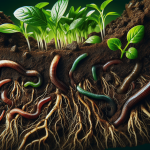This post may contain affiliate links. As an Amazon Associate, we may earn commissions from qualifying purchases.
Have you ever wondered if there’s a better way to nourish your garden or farm than using synthetic fertilizers? The heartwarming tale of organic fertilizers will leave you not only better informed but also perhaps a bit more charmed.
What Are Organic Fertilizers?
Definition and Basics
Organic fertilizers are derived from natural sources such as plant, animal, or mineral origins that sustain and enhance the diverse and complex life in the soil, rather than depleting it. Unlike their synthetic counterparts, which often deliver nutrients in a quick, albeit harsh manner, organic fertilizers work slowly, nourishing your plants over time.
Comparison Table: Organic vs. Synthetic Fertilizers
| Feature | Organic Fertilizers | Synthetic Fertilizers |
|---|---|---|
| Origin | Natural (plant, animal, mineral) | Man-made (chemical, industrial) |
| Nutrient Release | Slow and steady | Quick and immediate |
| Soil Health | Improves and sustains | Can degrade soil health over time |
| Environmental Impact | Low, environmentally friendly | Higher, potentially harmful |
| Cost | Often higher upfront | Usually cheaper upfront |
Organic fertilizers come in various forms such as compost, manure, bone meal, and green manure. Each type has unique properties and nutrient content, making them suitable for different gardening needs.
Sustainability and Environmental Impact
Soil Health
One of the charms of organic fertilizers is their ability to enhance soil structure. The organic matter in these fertilizers improves the physical properties of soil — increasing its ability to retain water and nutrients. This ultimately makes your plants more resilient during dry spells and more productive overall.
Moreover, organic fertilizers encourage beneficial microbial activity, fostering a thriving ecosystem that benefits plants. Organic matter breaks down slowly, ensuring a steady supply of nutrients for your plants.
Reducing Pollution
Synthetic fertilizers often run off into waterways, causing pollution and harm to aquatic life. This process, known as eutrophication, leads to excessive algae growth, which depletes oxygen in water bodies, killing fish and other aquatic organisms. Organic fertilizers, on the other hand, are much less likely to contribute to this issue, thanks to their slow-release properties and higher nutrient uptake rates by plants.
Lower Carbon Footprint
Producing synthetic fertilizers involves energy-intensive processes that release large amounts of greenhouse gases. In contrast, organic fertilizers typically have a significantly lower carbon footprint. By using organic fertilizers, you’re not only nurturing your plants but also contributing to the fight against climate change.

Human and Animal Safety
Fewer Chemicals
Organic fertilizers are free from the synthetic chemicals found in many commercial fertilizers. These chemicals can pose risks to humans and animals, particularly if they contaminate drinking water sources. By choosing organic, you reduce the likelihood of chemical exposure, creating a safer environment for everyone.
Non-Toxic to Pets and Wildlife
If you have pets that frequent your garden, or if you’re concerned about local wildlife, organic fertilizers are a safer choice. Animals are less likely to ingest toxic substances when they’re lolling around in soil that’s been treated with organic fertilizers.
Nutrient Availability and Plant Health
Balanced Nutrient Supply
Organic fertilizers often contain a diverse array of nutrients that benefit plants. Unlike synthetic fertilizers, which may supply only one or two essential nutrients, organic options provide a well-rounded diet. Elements such as nitrogen, phosphorus, and potassium are fundamental, but they also often include secondary and micronutrients essential for plant health.
Improved Root Growth
The slow and steady release of nutrients from organic fertilizers supports strong root growth. Plants with robust root systems are more resilient, better able to withstand stress, and more efficient at taking up water and nutrients.

Long-term Benefits
Soil Enrichment
Organic fertilizers contribute to the long-term health of your soil. By continually adding organic matter, you build up the soil’s structure and fertility over time. This isn’t just a temporary fix; it’s an investment in your garden’s future.
Pest and Disease Resistance
Healthy plants are naturally more resistant to pests and diseases. Organic fertilizers promote strong, vigorous growth, which can help deter pests and improve your plants’ ability to fend off diseases. This reduces the need for chemical pesticides, leading to yet another layer of environmental and health benefits.
Economic Considerations
Initial Cost vs. Long-term Savings
While organic fertilizers can be more expensive initially, their benefits often outweigh the costs in the long run. Healthier soil structure and better nutrient uptake reduce the need for frequent fertilization. Over time, this can lead to savings on fertilizer and water costs. Plus, you might find that your plants are healthier and more productive, potentially leading to higher yields.
Availability and DIY Options
Organic fertilizers are increasingly available at garden centers and through online retailers. Additionally, many organic fertilizers can be made at home, such as composting kitchen scraps or using animal manure. This not only saves money but also turns waste into a valuable resource for your garden.
Practical Tips for Using Organic Fertilizers
Selecting the Right Fertilizer
Choosing the right type of organic fertilizer depends on your specific gardening needs. For instance, compost is an excellent all-purpose amendment, while bone meal provides a boost of phosphorus, essential for root development. It’s helpful to know what your soil lacks and select a fertilizer that addresses those deficiencies.
Application Techniques
Proper application is crucial to maximize the benefits of organic fertilizers. Incorporating them into the soil rather than just applying them on the surface can improve nutrient availability. Be sure to follow recommended application rates to avoid over-fertilization, which can be harmful even with organic materials.
Timing
Timing your fertilizer application can make a significant difference. Typically, applying organic fertilizers in the spring and fall aligns with key growth stages for many plants. The slow-release nature of organic fertilizers means that they continue to nourish plants over an extended period, matching their natural growth cycles.
Potential Drawbacks and Solutions
Slower Results
One common criticism of organic fertilizers is that they work more slowly than synthetic options. This patience-testing aspect can be particularly challenging if you’re looking for immediate improvements. Combining organic fertilizers with practices like cover cropping and crop rotation can help improve soil fertility more quickly.
Variable Nutrient Content
The nutrient content of organic fertilizers can vary more than synthetic ones, meaning you might need to apply more frequently or mix different types to achieve a balanced nutrient profile. Conducting a soil test can help you understand your soil needs and tailor your fertilization strategy accordingly.
Storage Concerns
Organic fertilizers, particularly those with high moisture content, can be more challenging to store and may require specific conditions to maintain their effectiveness. Storing them in a cool, dry place can prolong their shelf life and ensure you get the most out of them.
Conclusion: Choosing Wisely for a Greener World
In the grand scheme of things, organic fertilizers offer numerous benefits that go beyond the immediate needs of your plants. They contribute to a healthier, more sustainable environment, foster long-term soil health, and create a safer space for humans and animals alike. While they may require a bit more patience and careful management, the rewards are well worth the effort.
By embracing organic fertilizers, you’re not just growing healthier plants. You’re nurturing a healthier planet. And that’s a legacy every gardener and farmer can be proud of.








